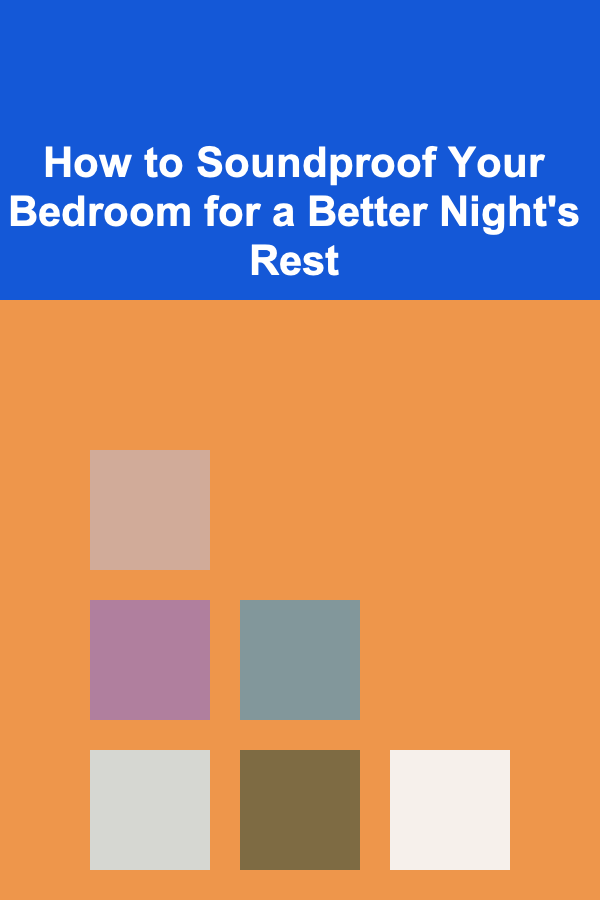
How to Soundproof Your Bedroom for a Better Night's Rest
ebook include PDF & Audio bundle (Micro Guide)
$12.99$7.99
Limited Time Offer! Order within the next:

A good night's rest is essential for physical and mental well-being. Sleep rejuvenates the body, refreshes the mind, and restores energy for the day ahead. However, a major disruptor of restful sleep is noise. Whether it's the traffic from outside, the creaking of floorboards, or the sounds of a busy household, noise can severely impact your sleep quality.
Soundproofing your bedroom is one of the most effective ways to create an environment conducive to deep, uninterrupted sleep. It transforms your bedroom into a sanctuary---away from the hustle and bustle of everyday life---allowing you to enjoy the peaceful slumber you deserve. This article explores various techniques and solutions to soundproof your bedroom and optimize it for better sleep.
The Importance of Soundproofing for Sleep Quality
Soundproofing your bedroom is not just about blocking out annoying sounds---it's about creating an environment that supports restorative sleep. The effects of poor sleep on your health can be profound. Research has shown that consistent sleep deprivation can lead to a variety of negative health consequences, including:
- Reduced cognitive function and memory impairment
- Increased stress and anxiety levels
- Weakened immune system
- Increased risk of cardiovascular disease
- Impaired decision-making and reaction times
Sleep disturbances from noise, particularly during the night, can reduce the amount of deep sleep you get. Deep sleep, also known as slow-wave sleep, is crucial for physical recovery, immune function, and memory consolidation. It is during this phase of sleep that the body repairs itself and processes emotions and memories.
In a world where noise pollution is on the rise, soundproofing your bedroom becomes an important step toward improving the quality of your sleep and, by extension, your overall health. By reducing external noise and improving the acoustics of the room, you can ensure a deeper, more restful slumber.
Types of Noise That Affect Sleep
Before diving into the methods of soundproofing, it's important to understand the different types of noise that could be disrupting your sleep. Noise is generally classified into three main categories:
1. Airborne Noise
Airborne noise refers to sounds that travel through the air. These can come from a variety of sources, including traffic, neighbors talking, barking dogs, or even street musicians. Airborne noise is the most common type of noise that disrupts sleep and can easily penetrate walls, windows, and ceilings.
2. Impact Noise
Impact noise is generated when an object physically contacts a surface. Common sources of impact noise include footsteps, dropping objects, or moving furniture. In apartments or multi-story houses, impact noise from upstairs neighbors can be especially disruptive.
3. Environmental Noise
Environmental noise includes sounds from the outside environment, such as traffic, construction, or the sounds of nature (rain, wind, etc.). Urban environments tend to have a higher level of environmental noise, but rural areas can also experience disruptions from natural sounds.
By identifying the type of noise affecting your bedroom, you can better address the issue and implement soundproofing strategies tailored to your needs.
How to Soundproof Your Bedroom
Soundproofing your bedroom involves both blocking external noise and reducing internal noise within the room. Below are several effective methods you can employ to soundproof your bedroom and create a peaceful environment for sleep.
Step 1: Seal Gaps and Cracks
One of the most straightforward and cost-effective ways to reduce noise in your bedroom is by sealing any gaps or cracks in the walls, doors, and windows. Even small openings can allow sound to pass through, making the room less soundproof.
Key Areas to Inspect:
- Around windows and doors: Check for gaps around the edges of your windows and doors. These areas can allow significant amounts of airborne noise to enter the room.
- Electrical outlets and light switches: Sound can travel through the tiny gaps around electrical outlets and light switches. Consider using acoustical sealant to seal these gaps.
- Walls and ceilings: Small cracks in the walls and ceilings can also let noise through. Caulking or sealing these areas can help block sound.
Materials to Use:
- Acoustic sealant: This is a flexible sealant that can be applied around windows, doors, and other gaps. It remains pliable over time, providing a long-lasting barrier to sound.
- Weatherstripping: Installing weatherstripping around doors and windows can help block out drafts and reduce noise.
By properly sealing these gaps, you can significantly reduce the amount of sound entering your bedroom.
Step 2: Upgrade Your Windows
Windows are one of the biggest culprits when it comes to sound intrusion. Single-pane windows and older windows are often poor at insulating against noise. Fortunately, there are several ways to upgrade your windows to improve soundproofing.
Options for Soundproofing Windows:
- Double-glazed windows: Double-glazed windows feature two layers of glass with an air gap between them. This air gap acts as a barrier that significantly reduces the transmission of noise. Double-glazing is highly effective at blocking both airborne and environmental noise.
- Window inserts: If replacing your windows isn't an option, you can install acrylic or glass inserts. These inserts fit inside your existing windows and create an additional barrier to noise.
- Heavy curtains or acoustic blinds: Adding thick, heavy curtains or acoustic blinds over your windows can also help block out external noise. These materials absorb sound and prevent it from entering the room.
Step 3: Use Soundproofing Materials on Walls and Ceilings
The walls and ceiling of your bedroom are primary points of contact for both airborne and impact noise. There are several materials and techniques that can be applied to these surfaces to enhance soundproofing.
Wall Soundproofing Techniques:
- Mass-loaded vinyl (MLV): MLV is a dense material designed to block sound. It can be applied to the walls or under drywall before installation. MLV is particularly effective at blocking airborne noise, including traffic sounds or voices.
- Acoustic panels: Acoustic panels, made from sound-absorbing foam or fabric-wrapped materials, can be mounted on the walls. These panels help absorb sound waves and reduce noise reverberation within the room.
- Double-layer drywall with Green Glue: Adding an extra layer of drywall and applying a sound-damping compound like Green Glue between the layers can significantly improve sound isolation. The Green Glue compound absorbs vibrations and reduces sound transmission.
Ceiling Soundproofing Techniques:
- Acoustic tiles: Installing acoustic tiles on the ceiling can help reduce sound reflections and minimize noise from above. These tiles are designed to absorb sound, making them ideal for bedrooms located beneath noisy neighbors or in multi-story homes.
- Suspended ceiling: For maximum noise reduction, a suspended or drop ceiling can create an air gap between the original ceiling and the new ceiling. This setup can effectively reduce both airborne and impact noise.
Step 4: Soundproof the Floor
Noise from footsteps, furniture movement, or dropped items can travel easily through hard flooring. To reduce impact noise, consider installing soundproofing solutions on your floors.
Floor Soundproofing Techniques:
- Cork underlayment: Cork is a natural sound absorber and can be installed beneath carpets or hard flooring to reduce both airborne and impact noise. Cork underlayment is particularly effective in apartments or multi-story homes.
- Carpets and rugs: Adding thick carpets or rugs can significantly reduce noise levels, particularly impact noise. The more cushioning and padding, the better the absorption. If you already have hardwood or tile floors, consider layering them with plush rugs for added soundproofing.
Step 5: Soundproof the Door
Doors are another potential source of noise leakage. A hollow-core door, for example, is more likely to allow sound to pass through than a solid-core door. There are several ways to make your bedroom door more soundproof.
Door Soundproofing Techniques:
- Solid-core doors: Solid-core doors are much denser and more effective at blocking sound compared to hollow-core doors. Consider replacing your bedroom door with a solid-core option.
- Door sweeps and seals: Installing a door sweep at the bottom of the door can help seal any gaps where sound might seep through. You can also apply weatherstripping around the edges of the door to block sound.
Step 6: Use White Noise or Sound Masking
If you are still dealing with residual noise after implementing soundproofing measures, you can use white noise or sound masking techniques to mask unwanted sounds and create a calming environment.
White Noise Machines:
A white noise machine generates a constant sound, such as a fan or static noise, that masks other sounds. By playing white noise at a low volume, you can effectively cover up background noises like traffic or street sounds without them disrupting your sleep.
Other Sound Masking Techniques:
- Nature sounds: Many sound machines or apps allow you to play nature sounds, such as rain or ocean waves. These sounds are relaxing and can help mask unwanted noises.
- Music: Soft, instrumental music or binaural beats can also help promote sleep by masking disruptive noises and creating a peaceful atmosphere.
Step 7: Manage the Environment
Beyond soundproofing techniques, managing your sleep environment is also essential for a restful night's sleep.
Tips for a Sleep-Friendly Environment:
- Darken the room: Light can interfere with your body's natural sleep-wake cycle. Use blackout curtains or shades to keep the room dark.
- Control the temperature: A cool, comfortable temperature is ideal for sleep. Aim for a room temperature of around 60-67°F (15-19°C) for optimal sleep.
- Limit screen time: The blue light emitted by electronic devices can interfere with your sleep. Avoid screens for at least an hour before bedtime.
Conclusion
Soundproofing your bedroom is a worthwhile investment that can have a profound impact on the quality of your sleep. By implementing strategies to block external noise, reduce impact sounds, and optimize the acoustics within your room, you can create an environment that promotes deep, restful sleep. Whether it's sealing gaps, upgrading windows, or using white noise machines, each step plays a role in transforming your bedroom into a sanctuary of peace and quiet. Take the time to soundproof your bedroom, and you'll wake up feeling rejuvenated, refreshed, and ready to face the day.
Reading More From Our Other Websites
- [Skydiving Tip 101] Step-by-Step Guide: How to Earn Your Skydiving License
- [Home Maintenance 101] How to Perform Regular Electrical Inspections to Ensure Safety
- [Home Pet Care 101] How to Set Up a Pet Care Routine While Traveling
- [Home Family Activity 101] How to Host a Family Science Experiment Day
- [Organization Tip 101] How to Create a System for Organizing Kids' Artwork
- [Organization Tip 101] How to Create a Vision Board in Your Workspace
- [Personal Finance Management 101] How to Manage Your Finances as a Freelance Worker
- [Home Space Saving 101] How to Streamline Your Laundry Room with Organization Tips
- [Home Pet Care 101] How to Maintain Your Pet's Nails and Paws
- [Beachcombing Tip 101] Regional Spotlight: Distinguishing the Most Iconic Seashells of the Pacific Coast

How to Get the Best Deals on Home Services While Sticking to a Budget
Read More
How to Host a Themed Party with Simple DIY Decorations
Read More
How to Light Your Home Like a Designer on a Budget
Read More
How to Make Money Online as a Graphic Designer: 10 Actionable Ideas
Read More
How to Use Stoic Philosophy for a Deeper Sense of Purpose
Read More10 Tips for Tracking Progress with a Meditation Planner
Read MoreOther Products

How to Get the Best Deals on Home Services While Sticking to a Budget
Read More
How to Host a Themed Party with Simple DIY Decorations
Read More
How to Light Your Home Like a Designer on a Budget
Read More
How to Make Money Online as a Graphic Designer: 10 Actionable Ideas
Read More